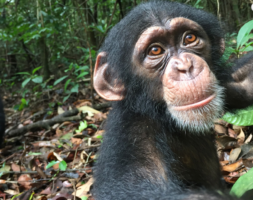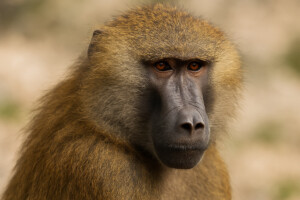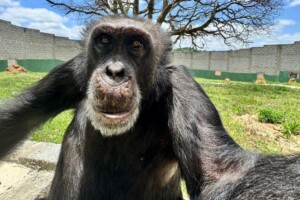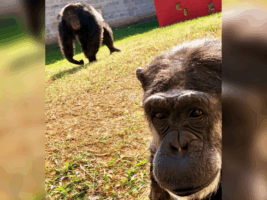The Darwin of our time

By Pedro Pozas Terrados (GAP Project Spain)
 On October 9, 2022, at the Royal Spanish Academy, in the presence of all the academics and authorities in sciences, knowledge and arts, as well as in that of several politicians, José María Bermúdez de Castro Risueño, took his place at the K, with a speech entitled “Nature, culture and evolution”, the first one delivered at the RAE. With a deep determination in his words, delivered openly and clearly, he showed us the great kinship we have with the two species of great apes/simians closest to humans, the chimpanzees and the bonobos.
On October 9, 2022, at the Royal Spanish Academy, in the presence of all the academics and authorities in sciences, knowledge and arts, as well as in that of several politicians, José María Bermúdez de Castro Risueño, took his place at the K, with a speech entitled “Nature, culture and evolution”, the first one delivered at the RAE. With a deep determination in his words, delivered openly and clearly, he showed us the great kinship we have with the two species of great apes/simians closest to humans, the chimpanzees and the bonobos.
Many of the people there rolled their eyes and others moved in their seats at what was being said. Words never uttered in an academic act of such importance and spoken by a great scientist, Co-Director of the Atapuerca Mountains, declared World Heritage Site, Prince of Asturias Award, writer, paleontologist, biologist, discoverer of homo antecessor and also scientific advisor to the Great Apes Project.
He gave us a lesson in humility and brought us down from our anthropocentric throne, comparing many of our cognitive abilities with those of the great apes and announcing clearly and forcefully that we are only a breath away from them in evolution time.
He clarified that: “Linnaeus first classified humans along with apes in the Anthropomorph group, finding no distinctive organic difference that would place us in a privileged place.” After much criticism from many of his contemporaries, “…who could not accept apes as created in the image and likeness of God,” in his tenth edition Linnaeus had to create the order of primates in which humans would be included. “The name was not chosen at random,” José María tells us, “because, in Latin, primus means the first or the chief,” although he nevertheless continued to share his privileged classification with the ape-like apes, also known as great apes. “Linnaeus never ceased to be criticized for his boldness in considering that human beings should be treated as just another species among the thousands he was able to describe and name,” concludes José María.
He explained to the audience, some of whom were perplexed, that culture is a body of knowledge that allows one to develop critical judgment, according to the academic dictionary: “For the vast majority of our species, culture makes us human and differentiates us from other primates. He then compares our physical differences with chimpanzees: we have lost most of our fur, we are bipedal, and our brain has tripled in size, among other traits. José María continues in another of his sentences: “But just a few decades ago, genomics caused a change in the classification of humans and apes. We share such a high percentage of our genes with chimpanzees, close to 99 percent, that it makes no sense to keep insisting on classifying them in a taxonomic category different from our own. The species Pan paniscus (bonobos), Pan troglodytes (chimpanzees) and Homo sapiens are now part of the same taxonomic category: the hominins,…”.
In the face of this clear call in the very house of the Royal Spanish Academy by a great scientist, the Darwin of our time, who is sitting in the Academy, expressed that: “in this sense, the two chimpanzee species are our obligatory reference and in evolutionary terms we are separated from them by a temporal sigh.”
To this end, he presented to the audience a number of qualities that we share together on our evolutionary paths. In front of the increasingly surprised listeners, he explained that RAE considers that: “politics is the activity of those who govern or aspire to govern public affairs.” José María explained that “…we humanize politics by considering it as an art and elevate it to the rank of doctrine.” Well, chimpanzees also practice politics.” There was laughter and reciprocal glances in the audience. Frans B.M. de Waal, a professor at Emory University in Atlanta, USA, taught us a lot about how alpha males achieve and maintain their power. It is not strength that is indispensable, but the alliances between men that allow one of them to lead. Those who help him receive special treatment: “Maybe a kind of bribe? They also gain the support of the females if they kiss their offspring. And José María says: “Haven’t we observed similar behavior among humans who aspire to win a presidential election? Again there was laughter and nodding.
José María continued: “The alliances between men and women can change according to the circumstances of the moment. How does that sound? Even in the best established democracies of the different peoples of the earth, the political party is nothing more than a representation of the alpha male, since those who belong to that party behave as a unit. Alliances, intrigues, plots, etc., are part of political activity. There are no qualitative differences between us and the species Pan troglodytes. We invent almost nothing, even though our methods are diverse and much more sophisticated.”
His voice is clear and concise, backed by his experience and his long years of research and inquiry into human evolution, and he sees clearly that chimpanzees and bonobos are a true reflection of ourselves and share the same common ancestor within the hominid family lineage.
It also reflected the territoriality of our species, a behavior that has been passed down through the human phylogeny through the ages, just like chimps, that while they limit themselves to food, we make additions of those raw materials that allow us to increase what we call gross domestic product. We create armed conflicts, says Bermúdez de Castro before the RAE, or speeches full of fallacies and arguments that don’t always are well founded. Chimpanzees, in their patrols in their territories, also practice violence against other groups of the same species. Bonobos, however, are more peaceful and avoid conflicts with greetings and hugs. In chimpanzees, hierarchy is exclusive to males. In bonobos, this hierarchy falls on the females.
Metacognition, this great scientist who landed at the Academy continues to tell us, seems to be a higher form of thinking that involves a high level of consciousness. It allows, for example, to manage simple cognitive processes into a more complex process and to develop its own strategies for better learning. It is an ability of human beings to reflect on their own thoughts. Well, chimpanzees and other apes also have metacognition, as has been proven in numerous studies published in prestigious scientific journals.
Similarly, José María continues in his speech, we have a sense of mortality, and we consider this trait to be unique to our species. But it has been shown that the behavior patterns of chimpanzees are exactly the same as ours, supported by studies such as those conducted by primatologist Alexandra G. Rosati, from the University of Michigan. They cultivate friendship in order to be protected when they get older: “Everything seems to indicate that the personal affection between two human beings comes from such ancient times that it also reached chimpanzees”.
Bermudez de Castro went on to say that another cognitive aspect that we also consider unique to our species, such as the sense of justice, has also been observed in chimpanzees and bonobos, before a sepulchral silence in the room, where the academics seemed to be in one of those debates that Darwin and his colleagues engaged in that disqualified him from announcing our approach to the great apes. Frans de Wal has been observing them for years and has found that they too have empathy, follow the social rules of the group to the letter, and have a very clear sense of fairness in sharing resources. Females often mediate when fights break out between two males. Females have been observed disarming a male to avoid harming another male. Adult chimpanzees have also been seen reacting with indignation when they see another specimen harming a youngster. This is adaptive behavior on behalf not of the individual, but of the group as a whole. “This is the very essence of human morality,” José María clarified with drive and determination.
Our Darwin of the Academy continued his speech by stating that we can add to the list a number of characteristics that we share with chimpanzees and bonobos. For example, both they and we laugh out loud and smile in certain situations. Many of the facial expressions that we represent in cute emojis are also present on chimpanzee faces when we express different emotions. Here some in the room also smiled in agreement with the words of the new scholar.
In his revealing speech, José María made it clear that chimpanzees prefer cooked food: “If they had managed to master fire, as we did less than a million years ago, I am convinced that these primates would cook their food before eating it”. He also referred to their impressive photographic memory, not forgetting to mention Kanzi the bonobo, who has mastered up to 200 lexical units and their corresponding meaning, can understand simple grammatical sentences, and can communicate with ease with his caregivers and his human environment. Kanzi is also a true expert in making and using stone tools: “If we accept that customs and traditions are part of what we mean by culture, then it is worth discussing the possibility that this concept can be applied to chimpanzees and perhaps to other primates.
There are already numerous scientific studies that leave no doubt that culture, as the concept is understood today, is not the property of humans, but of great apes, other primates, and even other species. José María explains, “Experts suspect that there are about 40 unique traditions acquired socially by chimpanzees, which we could consider as a type of incipient culture in these primates” and categorically states that: “I sincerely believe that the absolute rejection of biological determinism cannot imply the denial that we are just another species in the biosphere, with our corresponding genetic endowment.”
José María ended his great appeal in the very center of the House of Culture and in front of the people, many of whom were surprised by his statements, with a great criticism of our species, which is believed to be unique and yet we have become hostile even to ourselves. We are turning away from nature or simply denying the imperative need to maintain a reasonable balance with the environment. We are already paying a high price for this. “We must accept that cultural complexity has created a hostile environment even for the very species that created it. I hope and wish that many competent minds will unite their capacities to create a superior entity capable of proposing a model totally different from the current one.”
José María’s magnificent speech in the Royal Academy of Spain for numerous academics and scientists made the message of our kinship with the great apes very clear. In view of this, society in general, scientists from different areas, and the government itself must seriously rethink the abusive treatment that we humans treat our evolutionary brothers, locking them in cages for the pleasure and business of entertainment companies, cutting their freedom and their culture, leaving them isolated like lifeless patches as they lose all meaning to their lives. Even as many studies suggest, the chimpanzee and bonobo should also become members of our own genus “Homo”.
A law is certainly needed to protect non-human hominids from the barbarity of keeping them imprisoned, where many of them remain with serious psychological problems. It is not culture for our children to take them to a place where they are commercialized. It is not culture to see them lying on their premises, bored, with nothing to do, because everything is given to them. It is not culture to laugh at the jokes of the beings who suffer in captivity, beings from whom, as we heard in José María’s words, we are separated for only a slight temporal sigh. It is not culture to see the rest of living beings in cages, or to see dolphins and orcas imprisoned in small aquatic prisons, forcing them to perform acrobatics that do not suit their lifestyle.
The words spoken with great solemnity by José María, the Darwin of our time, should make us change our behavior, open our eyes, and show our empathy for all species, but in particular for those closest to us. The United Nations should enact their basic rights and they should be declared by UNESCO as the living heritage of humanity, so that they can follow their evolutionary path parallel to that of humans, without us having to exploit them, imprison them, or destroy their populations. It would truly be a great step towards resuming our life with nature and the beginning of seeing our environment and all living beings as an indisputable part of humanity’s very existence.
Watch the video of José María Bermúdez de Castro’s great speech on youtube.
Read more (in Spanish): https://elpais.com/cultura/2022-10-09/bermudez-de-castro-paleoantropologo-y-academico-de-la-rae-los-chimpances-tambien-practican-la-politica.html

 Español
Español
 Português
Português








